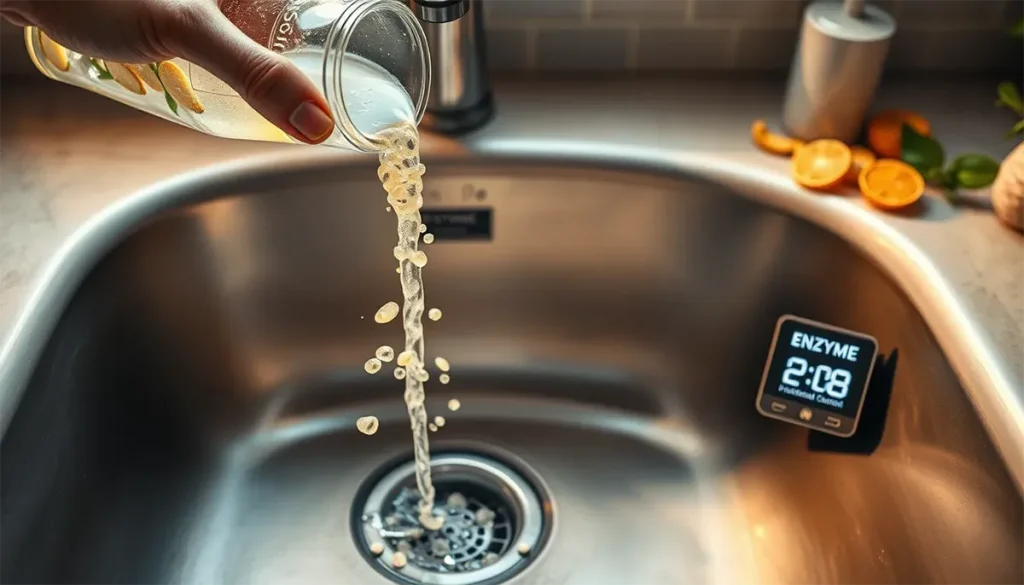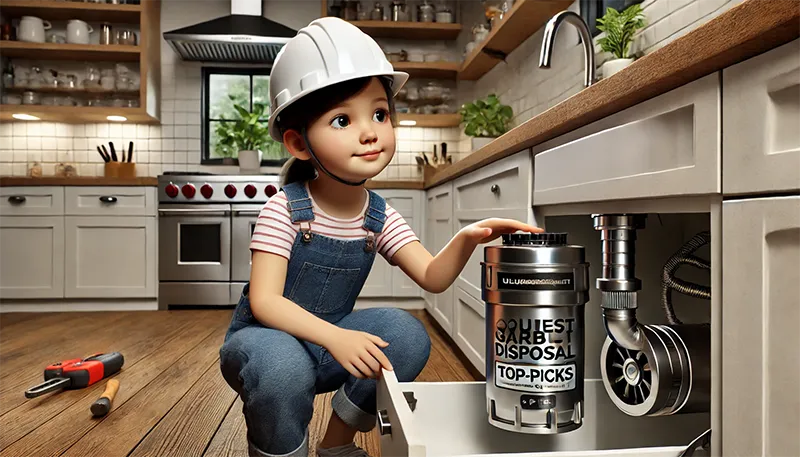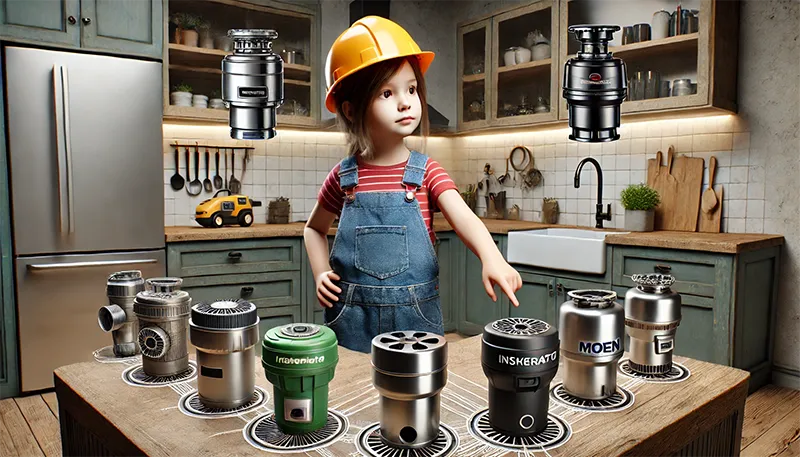In the realm of home maintenance, few issues are as persistent and frustrating as clogged drains. Whether you’re dealing with a slow-draining kitchen sink or a completely blocked pipe, the inconvenience can disrupt your daily routine and potentially lead to costly repairs. However, there’s a natural, effective solution that’s gaining popularity among homeowners and plumbing professionals alike: enzyme drain cleaners. These eco-friendly products harness the power of nature to keep your pipes flowing smoothly, offering a safe and sustainable alternative to harsh chemical cleaners. In this comprehensive guide, we’ll explore the world of enzyme-powered drain maintenance and reveal how these innovative products can revolutionize your plumbing care routine.
The Growing Problem of Drain Clogs
Before we dive into the solution, let’s take a moment to understand the scope of the problem. According to the Environmental Protection Agency (EPA), the average American household uses about 300 gallons of water per day, with a significant portion flowing through kitchen sinks. This high volume of water usage, combined with the organic matter that inevitably finds its way down our drains, creates the perfect conditions for clogs to form.
In fact, a study by the Water Research Foundation found that nearly 47% of households experience at least one clogged drain per year. This statistic highlights the widespread nature of the issue and the need for effective, long-term solutions. As we become more environmentally conscious, the demand for natural and sustainable drain maintenance options has surged, leading to the rise of enzyme drain cleaners as a preferred choice for many homeowners.
Understanding Enzyme Drain Cleaners
Enzyme drain cleaners represent a paradigm shift in how we approach drain maintenance. Unlike traditional chemical cleaners that use harsh substances to dissolve clogs, enzymatic cleaners work with nature, utilizing biological processes to break down organic matter and keep pipes clear.
The Science Behind Enzyme Power
At the heart of enzyme drain cleaners are specially cultivated bacteria that produce enzymes targeting specific types of waste. These microorganisms are carefully selected for their ability to thrive in the drain environment and produce enzymes that can effectively break down common clog-causing materials such as:
- Fats, oils, and grease (FOG)
- Food particles
- Hair and skin cells
- Soap residue
- Paper products
When introduced to your drain, these beneficial bacteria multiply rapidly, creating a colony that continuously produces enzymes to digest the organic debris clogging your pipes. This ongoing process not only clears existing blockages but also helps prevent future clogs from forming.
Types of Enzymes in Drain Cleaners
Different enzyme drain cleaners may contain various types of enzymes, each specialized to target specific substances:
- Lipase: Breaks down fats, oils, and grease
- Protease: Digests proteins found in food waste and organic matter
- Cellulase: Breaks down cellulose in paper products
- Amylase: Targets starches and carbohydrates
The most effective enzyme drain cleaners often contain a blend of these enzymes to address a wide range of potential clog-causing materials.
Choosing the Right Enzyme Cleaner for Your Kitchen Sink
When selecting an enzyme drain cleaner for your kitchen sink, it’s essential to consider several factors to ensure you’re getting the most effective product for your specific needs. Here are some key points to keep in mind:
Enzyme Blend
Look for products that contain a comprehensive blend of enzymes, with a particular focus on lipase for breaking down fats and oils commonly found in kitchen sink clogs. A multi-enzyme formula will be more effective at addressing various types of organic matter.
Concentration
The concentration of active enzymes in the product can affect its effectiveness and speed of action. Higher concentrations generally work faster but may come with a higher price tag. Consider your budget and the severity of your clog when choosing between different concentrations.
Form
Enzyme drain cleaners come in various forms, including liquids, gels, and powders. Each has its advantages:
- Liquid formulas: Easy to apply and quickly coat the inside of pipes
- Gels: Provide longer contact time with clogs, potentially increasing effectiveness
- Powders: Often have a longer shelf life and may be more economical for frequent use
Safety Profile
While enzymatic cleaners are generally safe for all types of plumbing systems, including septic tanks, it’s still important to review the product’s safety information. Look for cleaners that are non-corrosive and free from harsh chemicals.
Environmental Impact
Choose products that are biodegradable and eco-friendly. Many enzymatic cleaners are formulated to be safe for the environment, but it’s always good to double-check the manufacturer’s claims.
Brand Reputation
Research the brand and read customer reviews to gauge the product’s effectiveness and reliability. Look for companies that specialize in eco-friendly cleaning solutions and have a track record of producing high-quality enzymatic cleaners.
Application Instructions for Optimal Results
Now that you’ve selected the right enzyme drain cleaner for your kitchen sink, it’s crucial to apply it correctly to achieve the best results. Follow these step-by-step instructions for effective drain maintenance:
Prepare the Drain
Before applying the enzymatic cleaner, remove any standing water from the sink. This ensures that the product can directly contact the clog and pipe walls.
Measure and Pour
Carefully measure out the recommended amount of enzymatic cleaner. For most products, this is typically between 4-8 ounces. Pour the cleaner directly into the drain opening.
Allow Time to Work
The treatment time can vary depending on the severity of the clog:
- For minor clogs: Let the cleaner sit for 6-8 hours
- For moderate clogs: Leave the treatment overnight (8-12 hours)
Pro tip: Apply the enzymatic cleaner before bed to allow maximum working time without disrupting sink use.
Flush the Drain
After the treatment period, flush the drain thoroughly with hot water. This helps to wash away the broken-down debris and distribute any remaining enzymes throughout the pipe.
Repeat as Necessary
For stubborn clogs, you may need to repeat the treatment for several consecutive nights. Once the clog is cleared, implement a regular maintenance schedule to prevent future blockages.
Preventative Maintenance Schedule
To keep your kitchen sink drain flowing smoothly and prevent future clogs, incorporate enzymatic cleaners into your regular cleaning routine:
- Weekly: Apply a small dose (2-4 ounces) of enzymatic cleaner as a preventative measure.
- Monthly: Perform a more thorough treatment with a larger dose (6-8 ounces) and longer application time.
- Quarterly: Conduct a deep-cleaning treatment, allowing the enzymes to work overnight or even for a full 24-hour period.
By following this maintenance schedule, you can significantly reduce the likelihood of developing stubborn clogs and maintain optimal drain performance.
Maximizing the Effectiveness of Enzyme Drain Cleaners
To get the most out of your enzyme drain cleaner and ensure long-lasting results, consider these additional tips:
Consistent Temperature
Enzymes work best within a specific temperature range, typically between 68°F and 110°F (20°C to 43°C). Avoid using very hot water immediately before or after applying the cleaner, as extreme temperatures can deactivate the enzymes.
Avoid Chemical Cleaners
Chemical drain cleaners can kill the beneficial bacteria in enzymatic products, rendering them ineffective. If you’ve recently used a chemical cleaner, flush the drain thoroughly and wait at least 24 hours before applying an enzymatic treatment.
Use a Drain Strainer
Install a quality drain strainer to catch large food particles and debris before they enter the pipe. This reduces the workload on the enzymes and helps prevent major clogs from forming.
Be Patient
Unlike chemical cleaners that provide instant (but often temporary) results, enzymatic cleaners work gradually to break down organic matter. Give the product time to work, and resist the urge to use mechanical methods like plungers immediately after application.
Store Properly
To maintain the effectiveness of your enzyme drain cleaner, store it in a cool, dry place away from direct sunlight. Always check the expiration date before use, as the enzymes can degrade over time.
The Environmental Benefits of Enzyme Drain Cleaners
Choosing enzyme drain cleaners over traditional chemical solutions offers several environmental advantages:
- Biodegradability: The bacteria and enzymes in these cleaners naturally break down into harmless substances, minimizing environmental impact.
- Reduced chemical pollution: Unlike harsh chemical cleaners, enzymatic products don’t introduce toxic substances into water systems.
- Energy efficiency: By maintaining clear pipes, enzymatic cleaners can improve the overall efficiency of your plumbing system, potentially reducing water and energy consumption.
- Safer for wildlife: The natural ingredients in enzymatic cleaners pose minimal risk to aquatic life and ecosystems.
- Sustainable production: Many enzymatic cleaner manufacturers prioritize sustainable production methods, further reducing their environmental footprint.
FAQs
To address common concerns and provide additional clarity, here are some frequently asked questions about enzyme drain cleaners:
Q: Are enzyme cleaners safe for all types of pipes?
A: Yes, enzyme drain cleaners are generally safe for all plumbing systems, including PVC, copper, and older metal pipes. They’re also safe for use with septic systems.
Q: How long does it take to see results with enzymatic cleaners?
A: The time frame can vary depending on the severity of the clog and the specific product used. Minor clogs may clear within a few hours, while tougher blockages might require overnight treatment or multiple applications.
Q: Can I use other cleaning products with enzymatic cleaners?
A: It’s best to avoid using chemical drain cleaners or antibacterial products in conjunction with enzymatic cleaners, as these can neutralize or kill the beneficial bacteria. If you need to use other cleaning products, do so at least 24 hours before or after applying the enzymatic cleaner.
Q: Are enzyme drain cleaners effective for hair clogs?
A: While enzymatic cleaners can break down some types of hair, they’re generally more effective on organic matter like food waste and grease. For hair clogs, you may need to use a combination of enzymatic treatment and mechanical methods.
Q: How often should I use enzyme drain cleaners for maintenance?
A: For preventative maintenance, using an enzymatic cleaner once a week is typically sufficient. However, you may need to adjust the frequency based on your household’s specific needs and the amount of use your kitchen sink receives.
Q: Can enzymatic cleaners damage my garbage disposal?
A: No, enzymatic cleaners are safe for use with garbage disposals. In fact, they can help keep the disposal clean and odor-free by breaking down food particles that may accumulate in the mechanism.
Conclusion: Embracing the Enzyme Revolution
As we’ve explored throughout this guide, enzyme drain cleaners offer a powerful, natural solution for maintaining clog-free kitchen sinks and promoting overall plumbing health. By harnessing the power of beneficial bacteria and their enzymes, these innovative products provide an effective, eco-friendly alternative to harsh chemical cleaners.
The benefits of incorporating enzyme drain cleaners into your home maintenance routine are clear:
- Safe and gentle on all types of plumbing systems
- Environmentally friendly and biodegradable
- Effective at breaking down organic matter and preventing future clogs
- Improves the overall health and efficiency of your drains
By making the switch to enzyme drain cleaners and following a regular maintenance schedule, you can say goodbye to stubborn clogs and hello to smoothly flowing pipes. Not only will this save you time and money on potential plumbing repairs, but it will also contribute to a more sustainable and eco-conscious household.
We encourage you to share your experiences with enzyme drain cleaners on social media and spread the word about this natural drain maintenance solution. By working together to adopt more environmentally friendly practices, we can make a positive impact on our homes and the planet.
Take the first step towards clog-free drains today by incorporating enzyme drain cleaners into your kitchen sink maintenance routine. Your pipes—and the environment—will thank you!



